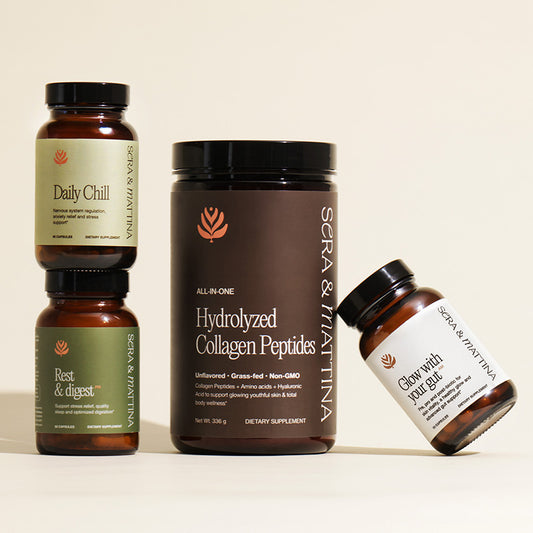If you move in health and wellness circles, I'm sure you know about the gut microbiome and its essential role in digestive health.
If not, I'll catch you up. The microbiome refers to some 10 trillion microscopic bacteria, yeast, and other organisms that live in your digestive tract. Scientists think several pounds of bacteria are just hanging out in your body.
It sounds creepy, but it’s really cool. We need these critters for digestion, vitamin synthesis, mood regulation, and immune health. Now, emerging research suggests having a more diverse microbiome improves sleep quality.1
Today, we're exploring the relationship between the gut microbiome and sleep.
So, What Is The Role Of The Microbiome In Sleep?
You operate on a 24-hour circadian rhythm (or body clock). It influences when you sleep, feel hungry, and secrete certain hormones. But you aren't the only one with a circadian rhythm. The composition and function of the gut microbiome fluctuate according to the time of day/night.
Poor sleep and sleep disorders like sleep apnea are associated with changes in the diversity of the gut microbiome2. Plus, shifts in your circadian rhythm may cause dysbiosis3 (an imbalance in the ratio of healthy to unhealthy bacteria in the gut). This explains why long-haul travel can leave your digestive system in tatters.
Missing out on sleep also makes you more likely to overeat processed foods that mess with your digestion – which then impacts sleep. As you can see, it's a vicious cycle!
The Microbiome-Gut-Brain Axis
You've probably heard your gut is your “second brain."
Your digestive system "talks" to your brain via the enteric nervous system (ENS). It's a network of 100 million neurons that extend from the brainstem to the colon. And it's bidirectional. This means what happens in your gut affects your brain, and what happens in your brain affects your gut.
Microbes produce metabolites like serotonin, GABA, melatonin, and short-chain fatty acids (SCFAs). These send signals to your brain via the ENS, helping to balance your sleep-wake cycle.
In short, improving the gut-brain axis is crucial to optimize your sleep.
Supporting Your Gut Microbiome for Better Sleep
Here are our tips for nurturing your gut microbiome to help you get good sleep every night:
1. Eat Prebiotic Foods
Your gut microbiome needs fuel to thrive – and that fuel comes from an indigestible fiber called prebiotic fiber. It's the stuff microbes ferment to produce hormones that support sleep quality.
Aim to eat a variety of fruits and vegetables – experts suggest at least 25 different plant foods per week. However, pay special attention to prebiotic-rich foods like asparagus, leeks, oats, bananas, artichokes, apples, legumes, and whole grains.
2. Supplement With A Quality Probiotic
Your microbiome is constantly under threat from stress, infections, antibiotics, processed food and alcohol, and environmental toxins. These factors destroy the ratio of good to bad bacteria and create havoc.
You can improve your gut microbiome diversity (and sleep) by supplementing with a high-quality probiotic containing lactobacilli and bifidobacteria. Also you can take a clean probiotic like Glow with your Gut also Rest & Digest A 2019 study found that taking a daily probiotic was a game-changer for overall well-being, mood, and sleep quality.
We also recommend snacking on probiotic foods like sauerkraut, kimchi, kefir, and yogurt.
3. Move Your Body Everyday
Promising research shows exercise improves the composition and diversity of the gut microbiome.
Dedicating just 30 minutes five days per week to moving your body can significantly increase the number of "healthy" gut bacteria. Just make sure it's something you enjoy!
4. Follow Sleep Hygiene
Creating a regular sleep routine will go a long way to helping you (and thus your microbiome) get good sleep.
These are some sleep hygiene tips everyone should adopt:
1. Exposing your skin and eyes to natural sunlight for 10-15 minutes when you wake up helps to reset your circadian rhythm. If this isn't possible, investigate using a bright light box.
2. Avoid coffee and caffeine-rich beverages after noon.
3. Don't look at blue light from screens in the hour leading up to bedtime.
4. Create a relaxing routine by listening to an audiobook, doing yoga stretches, or engaging in gentle breathing.
5. Invest in blackout curtains or a quality eye mask to make your sleep environment as dark as possible.
6. If you have an air-conditioner, 60-70°F is the ideal room temperature to help you fall asleep.
Conclusion
Your body is a complex collection of intertwined systems that influence one another. Nowhere is this more obvious than in the gut-brain-sleep relationship.
Looking after your gut health using diet, exercise, high-quality probiotics, and other lifestyle changes can help you get better rest. Doing so helps to regulate the biological rhythms of your microbiome. It's a win-win!
xx







